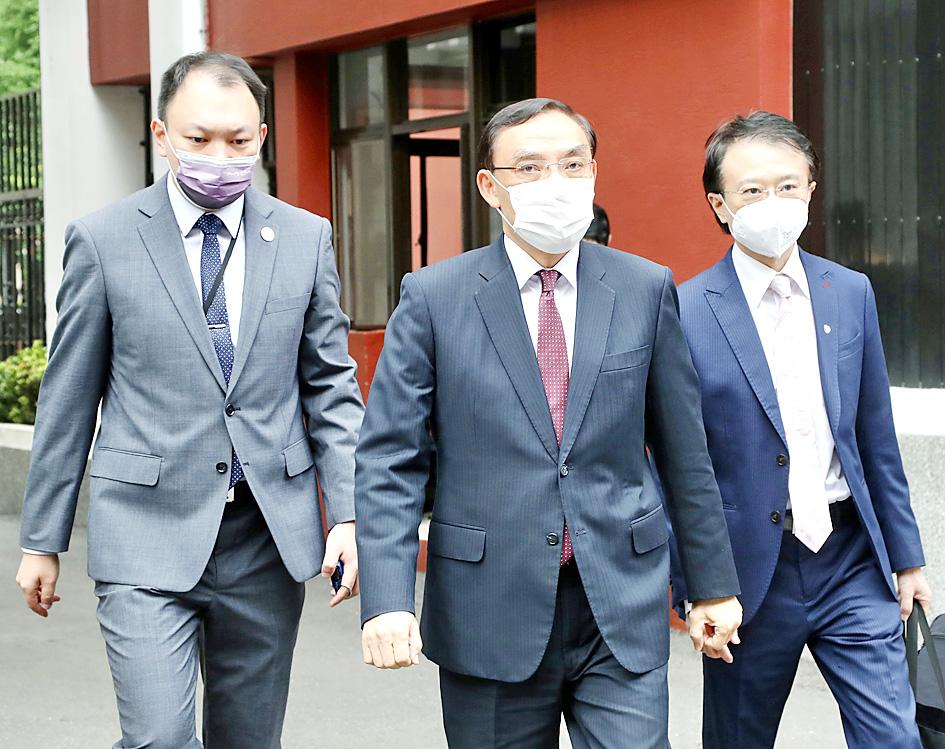The Ministry of Justice yesterday said that it is considering whether the nation should enact legislation to target hate crimes after a shooting targeting the Irvine Taiwanese Presbyterian Church last week killed one person and injured five.
The suspect is 68-year-old David Weiwen Chou (周文偉). He was born in Taiwan before emigrating to the US.
He was a member of the National Association for China’s Peaceful Unification, the Orange County Sheriff’s Department said. Police found notes in his car expressing his dislike of Taiwanese and indicating that Taiwan should not be an independent state separate from China.

Photo: CNA
Chou is believed to have targeted the Irvine congregation as the Presbyterian Church in Taiwan has been supporting Taiwanese independence.
Democratic Progressive Party (DPP) Legislator Lo Chih-cheng (羅致政) last week told a news conference in Taipei held by the Presbyterian Church that he would propose legislation to punish hate crimes.
“Many countries have taken similar legal actions to deter hate crimes and hate speech,” Lo said. “The DPP will work with opposition parties to ensure that laws protect people against hate crimes.”
Minister of Justice Tsai Ching-hsiang (蔡清祥) told reporters at the legislature in Taipei that the ministry could begin by reviewing comparable regulations in other nations.
“We will also consult the opinions of legal experts on this matter,” Tsai said. “If the current regulations are deemed to be inadequate to prevent hate crimes, we could consider proposing a new bill.”
Meanwhile, the Irvine Taiwanese Presbyterian Church on Sunday morning held a memorial service for 52-year-old sports physician John Cheng (鄭達志), who was killed while trying to stop the gunman on May 15.
Representative to the US Hsiao Bi-khim (蕭美琴) attended the service on behalf of President Tsai Ing-wen (蔡英文).
“Cheng voluntarily took the bullet from the suspect and prevented a massacre with his life... His sacrifice is a testimony of the integrity, kindness and bravery of Taiwanese people and will stay in everyone’s heart,” Hsiao wrote on Facebook.
“The suspect resorted to violence and harmful actions simply because of differences in political ideologies, which in comparison seemed fragile and insignificant,” she wote, adding that she has asked the Ministry of Foreign Affairs and the Taipei Economic and Cultural Representative Office to protect Taiwanese expatriates.

CHAOS: Iranians took to the streets playing celebratory music after reports of Khamenei’s death on Saturday, while mourners also gathered in Tehran yesterday Iranian Supreme Leader Ayatollah Ali Khamenei was killed in a major attack on Iran launched by Israel and the US, throwing the future of the Islamic republic into doubt and raising the risk of regional instability. Iranian state television and the state-run IRNA news agency announced the 86-year-old’s death early yesterday. US President Donald Trump said it gave Iranians their “greatest chance” to “take back” their country. The announcements came after a joint US and Israeli aerial bombardment that targeted Iranian military and governmental sites. Trump said the “heavy and pinpoint bombing” would continue through the week or as long

TRUST: The KMT said it respected the US’ timing and considerations, and hoped it would continue to honor its commitments to helping Taiwan bolster its defenses and deterrence US President Donald Trump is delaying a multibillion-dollar arms sale to Taiwan to ensure his visit to Beijing is successful, a New York Times report said. The weapons sales package has stalled in the US Department of State, the report said, citing US officials it did not identify. The White House has told agencies not to push forward ahead of Trump’s meeting with Chinese President Xi Jinping (習近平), it said. The two last month held a phone call to discuss trade and geopolitical flashpoints ahead of the summit. Xi raised the Taiwan issue and urged the US to handle arms sales to

State-run CPC Corp, Taiwan (CPC, 台灣中油) yesterday said that it had confirmed on Saturday night with its liquefied natural gas (LNG) and crude oil suppliers that shipments are proceeding as scheduled and that domestic supplies remain unaffected. The CPC yesterday announced the gasoline and diesel prices will rise by NT$0.2 and NT$0.4 per liter, respectively, starting Monday, citing Middle East tensions and blizzards in the eastern United States. CPC also iterated it has been reducing the proportion of crude oil imports from the Middle East and diversifying its supply sources in the past few years in response to geopolitical risks, expanding

Pro-democracy media tycoon Jimmy Lai’s (黎智英) fraud conviction and prison sentence were yesterday overturned by a Hong Kong court, in a surprise legal decision that comes soon after Lai was jailed for 20 years on a separate national security charge. Judges Jeremy Poon (潘兆初), Anthea Pang (彭寶琴) and Derek Pang (彭偉昌) said in the judgement that they allowed the appeal from Lai, and another defendant in the case, to proceed, as a lower court judge had “erred.” “The Court of Appeal gave them leave to appeal against their conviction, allowed their appeals, quashed the convictions and set aside the sentences,” the judges